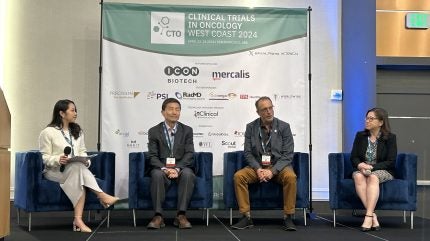
Representatives from the biopharma industry agreed that “intentional effort” is required from sponsors to ensure diverse populations are reached in clinical trials for cancer treatments.
The remarks were made from a panel at the Clinical Trials In Oncology West Coast 2024 in San Francisco held from 23 April to 24 April.

Discover B2B Marketing That Performs
Combine business intelligence and editorial excellence to reach engaged professionals across 36 leading media platforms.
“The entire system of clinical development is biased [in terms of patient diversity]. It’s difficult to change that dynamic, but it is happening slowly,” said Oscar Segurado, ASC Therapeutics’ chief medical officer.
“Ultimately when a drug is approved, we want the drug to have the biggest number of patients available to it.”
The US Food and Drug Administration (FDA) is addressing the historical lack of inclusion from underrepresented groups in clinical trials by introducing diversity recommendations to sponsors.
Cecilia Tran-Muchowski, ProfoundBio’s head of clinical operations, said “Even though the guidelines are not finalised, it’s important [for the pharma industry] to look at.”

US Tariffs are shifting - will you react or anticipate?
Don’t let policy changes catch you off guard. Stay proactive with real-time data and expert analysis.
By GlobalDataSpeaking on ProfoundBio’s activities in light of the FDA’s expectations, Tran-Muchowski said the company is “very intentional.”
Sponsor considerations will be critical going forward as treatments become more nuanced against a landscape of rising cancer prevalence across all demographics. The push for diversity, equity, and inclusion (DEI) has become a pivotal focus of legislation by the FDA. Going forward, clinical data from trials will need to demonstrate a drug or biologics’ safety and effectiveness in multiple subgroups.
From a sponsor’s point of view, measuring that success in clinical data demonstrates that you support [FDA guidance] Tran-Muchowski added.
ProfoundBio, which was acquired by Genmab in a $1.8bn deal this month, specialises in antibody drug conjugates (ADCs). The company is currently conducting a Phase I/II trial for advanced tumours indications, including breast and ovarian cancer.
Various facilitators, such as technology and community-based programmes, were discussed during the session, but the main sentiment shared by the panel was sponsor awareness and proactiveness is critical in tackling the problem.
Chuanbo Xu, Freenome’s senior director head of clinical development, said: “We need to study every group. We are trying hard to look out different racial ethnic backgrounds, social economic status, and geographic locations.”
Freenome is currently conducting a clinical trial for its blood-based test for colorectal cancer detection – which involves a staggering 50,000 participants. Despite the size of the trial, Xu said: “Clearly, we are making efforts to ensure we have representability.”
Xu explained that all parties involved in clinical trial operations – including but not limited to clinicians, investigators, and patient advocacy groups – are key in achieving diversity mandates.
“All of these [groups] work together to ensure study populations will be representative.”
Tran-Muchowski said that external partnerships are important for many companies going forward. She added that ProfoundBio is working with GlobalData to assess whether strategy deployment.
Segurado pointed towards the juxtaposition in trial recruitment number trends. ASC Therapeutics focuses on cell therapies for rare cancers. Population size for trials in this space are usually limited.
This indicates that whilst final FDA recommendations are imminent, completely changing the paradigm across the board likely has a long road ahead.
Segurado added: “We’re going in the right direction but we’re not there yet.”





